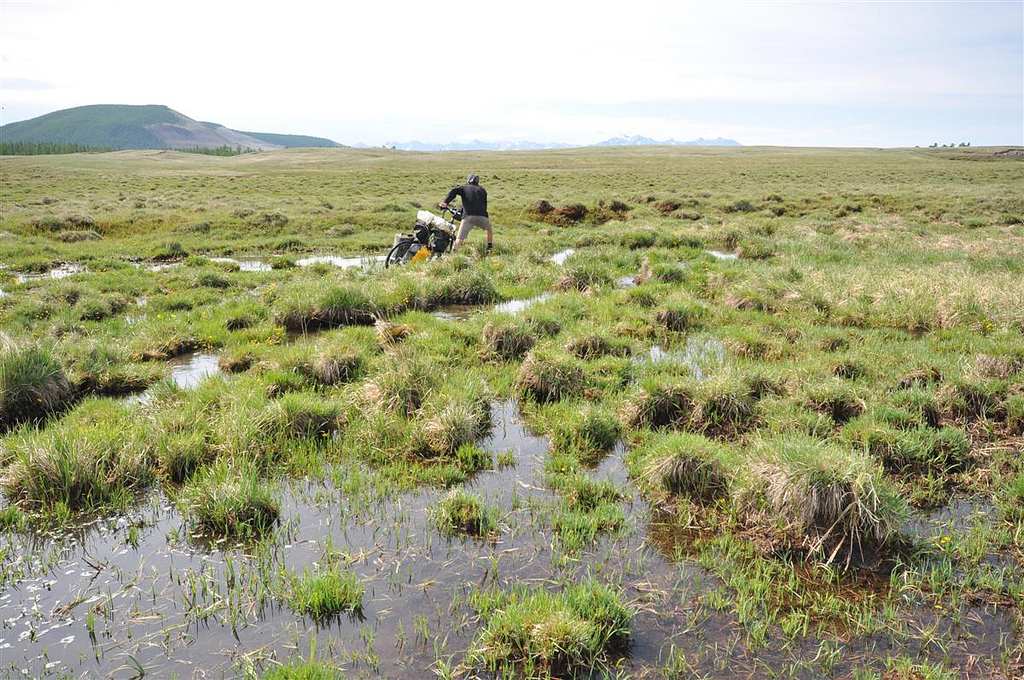There’s one important thing to understand about adversity:
You can’t prevent it.
It is a consequence of life on Earth over which you have no control.
You might choose to stave off situations of adversity — bad weather, hunger, lack of shelter, indecision, getting lost, and in general being way out of your comfort zone — simply by staying at home. But your comfort zone will become stagnant. You will, through inaction, have created a situation of existential adversity.
Out on the road, when your daily routine is grounded in the immediate and present and tangible, your problems will follow suit. An unexpected fork in the road. A setting sun and nowhere to camp. A sudden equipment breakage. Draining the last of your water in the middle of the empty desert. You will be faced with a problem that is immediate, present, tangible, and in need of a solution.
There is one (and only one) way of combating fear and adversity.
It is taking action.
When we express fear and concern towards such situations, and perhaps even cite them as reasons for stalling the act of departing on a big adventure, what we are really doing is expressing our fear of being solely responsible for taking action and being inventive enough to find a solution.
Modern life’s problems are, for the most part, intangible or intellectual in nature. You’ve lost a client at work. A credit card payment has been missed. The car needs fixing again. It is all too easy to shirk responsibility for these problems, because they can generally be delayed (I’ll get it fixed next week), ignored (I’ll just file the bill away for ‘later’) or the baton handed to someone else (it wasn’t my fault we lost the client).
Problems on the road — the ones we imagine, and the ones that really happen (and they do) — will accept no such excuses. We need to find water now. This thing needs fixing immediately. I need a place to sleep tonight. We need to find our way through and get going. Modern life, so abstract and vapid, does not prepare us particular well for solving real, in-your-face problems proactively, calmly and effectively.
Yet if it really were not possible to deal with such situations — in other words, if we were not able to change our attitudes despite all those years of complacency — then adventurers would be returning home in droves, having fallen at the first hurdle.
But they don’t. They return later and evangelise, problems and all. They clearly haven’t come to any harm. In fact, they seem far too laid back about these concerns, and it ends up making you suspicious. Exactly what is going on here? Were they born like this? If not, what changed?
It’s very simple. Though it may at first take place haltingly, the continuous problem-solving required by long personal journeys is not a test but a teacher. It’s a teacher of the crucial attitude of proactivity, and of taking responsibility for oneself.
Each day is unique and brings its own challenges and joys in an antithesis of the daily grind, even though many aspects of life on the road are indeed routine. The consequence is that you will be — quite literally — forced to negotiate it. There’s no avoiding it. You can’t switch it off. You can’t file it away. You might try to ignore it, but it doesn’t take more than one shivering night in the open, a few hours without drinking water or food, a handful of sessions of kicking yourself over not asking for help, or a day of getting hopelessly lost, to convince someone with tendencies towards passivity and irresponsibility that there is only one way to deal with these situations: to adopt an attitude of proactive, responsible problem-solving. In short: stop dithering and do something.
Then repetition and experience kick in, and the result is that these ‘problems’ you once poured so much energy into trying to avoid simply become part and parcel of daily life, no more or less disturbing or significant than any other aspect. It happens cumulatively, not overnight, so you barely notice until you stop and look back. Which goes a long way towards explaining why seasoned adventurers so flippantly shrug off the imagined fears of those back home. These fears have been dealt with so routinely that they are no longer worth fearing at all. Looking back is difficult.
Do you think that I, or any other long-term traveller, was born with a talent for sleeping rough and getting away with it, enjoying myself on less than 5 Euros a day, cycling a hundred miles in one go as a matter of routine, navigating without maps or guidebooks, repairing my gear without a second thought, and interacting with people on four continents speaking a couple of dozen languages and no English? Of course not!
I and many others have chosen a lifestyle consisting of a great deal of exotic and occasionally scary-sounding adventures. But I didn’t choose to become proficient in dealing with all that this life could throw at me. It was learned out of necessity and through a great deal of mistakes. I was forced to get good at this stuff.
Leave home and you too will become a pragmatic, proactive problem-solver. Basic survival instincts will prove far, far stronger than ingrained habits of laziness or inaction could ever be. By necessity and circumstance you too will be forced to get good at this stuff.
What this all means, of course, is that you need no longer worry about all these ‘what-ifs’, these fears and imagined problems.
Worry only about leaving.
Leave soon.
Leave before you’re ready.
When a problem occurs, you will find a solution. You won’t have any choice.


Something to add?